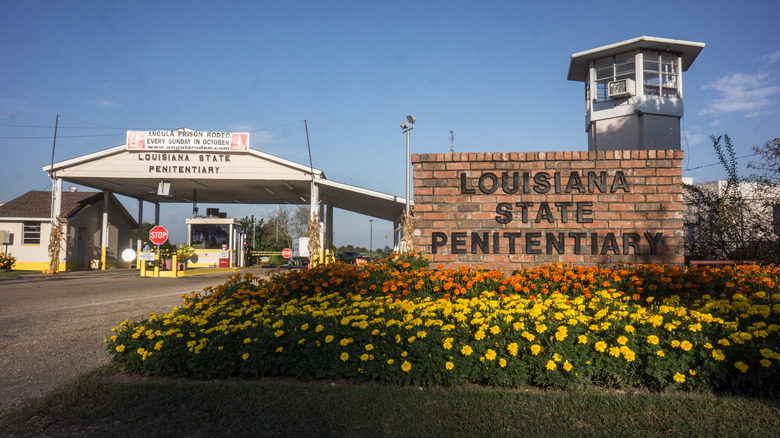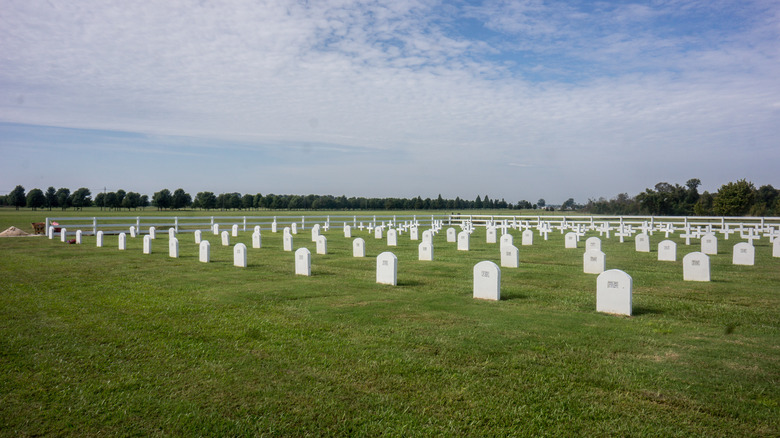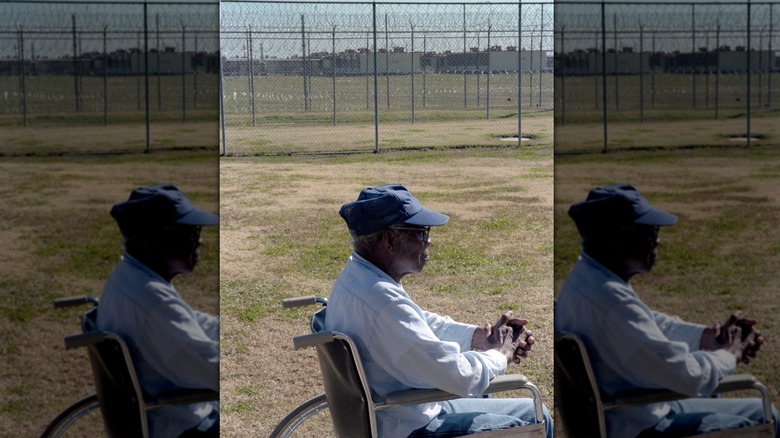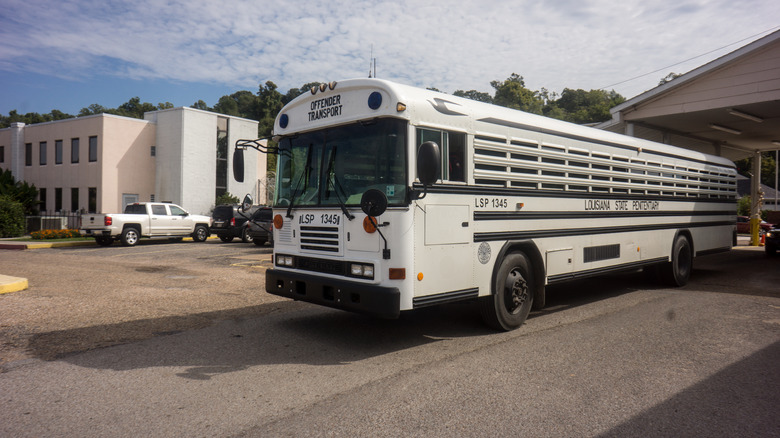Why Louisiana's Angola Prison Is So Dangerous
Men work the fields picking cotton and sugarcane while armed guards on horseback watch over them in the sweltering Louisiana heat. But this is no antebellum plantation — it's the biggest maximum-security prison in the United States, the Louisiana State Penitentiary at Angola. The prison is located an hour north of Louisiana state capital, Baton Rouge. It started out as an actual plantation where enslaved Black people picked the same crops the prisoners — 74% of whom are Black — do today under similar conditions, per the ACLU Louisiana and the U.S. Army Corps of Engineers.
Field work is the default job for most prisoners at Angola, and switching over to other work is difficult. For their labor, prisoners earn as little $0.02 per hour; the "high" end of their income might reach $0.40. Refusing to work — or not working fast enough — can earn inmates time in solitary confinement, and prisoners have been known to pass out from dehydration. During the COVID-19 pandemic, some businesses avoided shutdowns by using convicts from Angola and other penitentiaries.
If that wasn't enough to mark Angola down as a dark place to serve time, there's also a lack of medical care, high rates of suicide, drug overdoses, and abysmal living and working conditions, according to PBS. Conditions are so severe — and have been for years — that a prison union staged a peaceful work stoppage in 2018 to demand changes; it was put down within the day.
'The Bloodiest prison in America'
Besides its size and its brutal working policies, Angola prison has a reputation for danger. The facility houses violent criminals in a setting with a reputation for inmate-on-inmate brutality and rape who are watched over by underpaid guards and vicious wolf-dog hybrids, per ProPublica and The Wall Street Journal. Angola has been called "the bloodiest prison in America," according to The Daily Beast. But in many cases it's the guards to blame for the violence. In July 2020, a federal court sentenced three former Angola correction officers to prison and a fourth to probation for beating a shackled inmate, resulting in a dislocated shoulder, broken ribs, and a collapsed lung, and then trying to cover it up, according to the U.S. Justice Department.
For many of Angola's inmates, these conditions are all they'll know for the rest of their lives. Of the more than 6,000 inmates at the sprawling prison, 65% of them are serving life sentences. Even after death, many of these prisoners won't leave Angola's grounds — their bodies will be interred in the prison cemetery, per the Center for Land Use Interpretation. Ironically, the town B-Line, home to some 1,600 prison employees, exists in the middle of Angola's grounds, and the prison is famously accessible. Movies have used it as a location, and the Angola Museum onsite is a highly rated tourist attraction. Among the exhibits is a display of weapons confiscated from inmates.
Lack of medical care
Louisiana has the highest per-capita incarceration rate, according to Prison Policy Initiative, and a report by The U.S. Department of Justice's Bureau of Justice Statistics found that from 2001 to 2019 the most deaths per 100,000 inmates in the U.S. — both at the federal and state level — were in Louisiana state prisons. Some of that may be attributable to Angola State Prison's subpar medical care. In 2021, Federal District Court Judge Shelly K. Dick slammed the institution for not providing adequate medical care to the point of violating the U.S. Constitution's Eighth Amendment by inflicting "cruel and unusual punishment" on the inmates, per the ruling (via Justia). In her decision, the judge found "overwhelming deficiencies in the medical leadership and administration of health care" at the prison, which had been aware of the issues "for decades." Angola also violated the Americans with Disabilities Act.
Much of the medical staff at the penitentiary have issues of their own, with some of the full-time doctors having had their medical licenses suspended at one time or another, according to a 2020 ProPublica investigative report. Between inmate and prison guard violence, deplorable conditions, and negligent medical care, it all adds up to Angola being a very dangerous prison in which to serve time.
Young prisoners were put at risk
In July 2022, it was decided to temporarily house a number of juvenile prisoners in Angola until a new facility was ready. A year later, advocates and the ACLU alleged that those young prisoners were being exposed to dangerous conditions. Per PBS, a federal court filing said that young inmates — housed in a former death row building — were given unsanitary food and water and exposed to dangerous heat, with the heat index sometimes reaching 130 degrees. Such heat also posed psychological danger to these prisoners, as did prolonged periods of isolation. At least one prisoner claimed to have been exposed to chemicals used to subdue another inmate. That same person also said a guard once slammed them into a wall.
An earlier lawsuit challenging the transfer of young prisoners to Angola was rejected by a judge, who declared the inmates a danger to themselves and others. The July 2023 challenge resulted in an order to transfer juvenile inmates from Angola by September 15. Per AP, the state of Louisiana complied, but it continued an appeal against the order as well.



